MESOP NEWS INSIGHT : American Sanctions Hit Islamic State’s Finances, Propaganda & Terrorism
Just three days after the U.S. government sanctioned two Islamic State (IS or ISIS) operatives for their role in helping the jihadists develop chemical weapons of mass destruction, another raft of sanctions were issued on 15 June against four IS members occupying varying positions within the organization from finance to propaganda to orchestrating the foreign attacks.
UMAR MAHMUD RAHIM AL-KUBAYSI AND AL-KAWTHAR MONEY EXCHANGE
The U.S. Department of the Treasury’s Office of Foreign Assets Control (OFAC) imposed sanctions on IS member Umar al-Kubaysi and his company, Al-Kawthar Money Exchange, for “play[ing] an important role in ISIS’s financial operations by moving money both within and outside of ISIS-controlled territory”. The sanctions, undertaken in coordination with the Iraqi government, are “the first designations of ISIS-linked money services businesses”.
Umar al-Kubaysi has been “transferring operational funds” for the IS movement since 2006, the year IS changed its name from al-Qaeda in Mesopotamia (AQM) to the Islamic State of Iraq (ISI). “Since then, al-Kubaysi has worked with an ISIS weapons facilitator,” according to Treasury. In 2014, al-Kubaysi was involved in smuggling pickup trucks from Syria into Iraq. “[A]s of mid-2016, al-Kubaysi was involved in financial activities with ISIS”. Al-Kubaysi’s financial facilitation work for IS has been done through Al-Kawthar, which is located in IS-controlled territory and which al-Kubaysi owns.
Al-Kawthar appeared on a list of high-risk financial intermediaries put out by the Canadian government at the end of last year. IS has a long record of co-opting even legitimate business enterprises operating in areas where it has influence to gain revenue. Just this week, Lafarge, a French cement company that has since merged with the Swiss company Holcim to become LafargeHolcim, the world’s biggest cement maker, admitted to what has been more or less known since March: it engaged in unacceptable conduct to keep the factory it operated in Jallabiya, between Minbij and Raqqa, open until September 2014, which involved the payment of cash to “sanctioned parties” (though it neither confirms nor denies whether this means IS). A RAND study based on IS’s internal documents found that the group’s “second-largest revenue source from August 2008 to January 2009 was contracting work—the extortion of contracted projects in and around Mosul”—and these included “soft-drink manufacturers, mobile-phone companies, and flour and cement factories”. The signs of IS’s infiltration of the Iraqi banking sector are even more worrying. By Treasury’s evidence, Al-Kawthar has been facilitating money transfers to IS since at least 2013.
Between late 2015 and early 2016, Al-Kawthar “reconciled financial transfers worth approximately $2.5 million with another Iraq-based money exchange company that was associated with ISIS financial facilitators” using “a Gulf-based company, which is co-owned by two suspected ISIS facilitators,” Treasury reports.
Before that, in the spring of 2014, al-Kubaysi, as the owner of Al-Kawthar, had “reconciled deposits and withdrawals with the Hanifa Currency Exchange, which is owned by ISIS financial facilitator Fawaz Muhammad Jubayr al-Rawi,” Treasury notes.
Fawaz Jubayr al-Rawi and the branch of Hanifa Currency Exchange he runs in al-Bukamal, the key Syrian town in Deir Ezzor that has acted as a gateway for jihadists transiting from Syria into Iraq for fifteen years, were sanctioned by the U.S. Treasury in December 2016. Al-Rawi had opened Hanifa in 2010 as a “money services business, which he used to exchange currency between exchange houses in Albu Kamal and Turkey”. In 2014, al-Rawi gave bay’a (pledge of allegiance) to IS, according to Treasury, and his business became exclusively for IS. IS “considered al-Rawi important due to his contacts outside of Syria”. As of August 2015, al-Rawi was facilitating IS’s financial operations, notably payments to its fighters, and oversaw money exchanges. At the same time, al-Rawi “hosted [IS] leaders, including top level [IS] commanders and fighters, at his farm in Albu Kamal for weekly meetings”. Al-Rawi was a financial emir by May 2016, if not before, and had long been involved in storing large amounts of cash for IS. It was reported late on 16 June 2016 that al-Rawi had been killed in his hometown by an airstrike from the U.S.-led Coalition.
USAMA AHMAD ATAR
Simultaneous with the sanctions on al-Kubaysi, the State Department imposed sanctions on three more IS operatives, labelling them Specially Designated Global Terrorists (SDGTs).
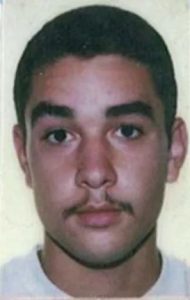
Image of Usama Atar c. 2005, used by campaigners for his release
By far the most interesting name on State’s list is Umar Atar, described as “a senior leader of ISIS’s external operations efforts,” who “has established a network to carry out attacks in Europe” and “was a leading coordinator of the November 2015 Paris attacks and March 2016 attacks in Brussels”. Atar “was responsible for recruiting, training, and sending at least some of the individuals to Paris” and “recruited and mentored two of the bombers” for Brussels.
In their examination of the Francophone network behind the Paris and Brussels attacks, Jean-Charles Brisard and Kevin Jackson identified Atar as having played a “central role”.
Atar was born in 1984 in Laeken, Belgium; he is of Moroccan descent. Among Atar’s cousins were Ibrahim and Khalid al-Bakraoui, at least one of whom he helped to radicalize. The Bakraoui brothers, with Najim Laachraoui, carried out the suicide attacks in Brussels on 22 March 2016. This family dynamic has enabled IS to function with more operational security than the Qaeda networks in Europe of years past, which proved vulnerable to penetration by intelligence services.
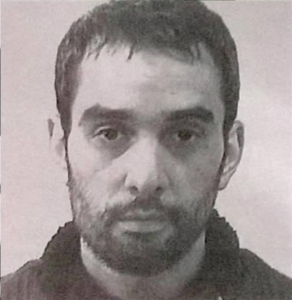
Usama Atar after his release in 2012
Atar is one of IS’s “originals”: he travelled to Iraq in 2002, when IS’s founder, Ahmad al-Khalayleh (Abu Musab al-Zarqawi), was already in Baghdad with high-level jihadists and the group was organizing and recruiting. Atar was arrested in Ramadi in February 2005 and convicted by an Iraqi court in 2007. Sentenced initially to life imprisonment, Atar’s sentence was later reduced to ten years. Atar served time in Abu Ghraib, Camp Cropper (where Saddam Husayn himself was held), and Camp Bucca. In September 2012, after an intense media campaign and under diplomatic pressure from the Belgian government, Atar was released back to Belgium.
Atar was released by Iraq on condition he was monitored and not given a passport. For reasons unclear, Atar was given able to obtain a passport and in early 2013 he travelled to Tunisia. Knowing what he was, the Tunisian government demanded his departure, and Atar went to Turkey, where he disappeared, doubtless along the same ratlines that have brought tens of thousands of other jihadi-salafists into Syria.
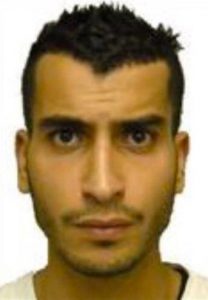
Abdelilah Himich (Abu Sulayman al-Firansi)
Atar has used the name “Abu Ahmad,” and acted as a guide for IS’s Amn al-Kharji or foreign intelligence service. Amn al-Kharji was headquartered in al-Bab until IS was expelled from the city by the Turkish military, working alongside the Syrian opposition. Interestingly, it is (or was) another French speaker, Abdelilah Himich (Abu Sulayman al-Firansi), who heads Amn al-Kharji.
Based in Raqqa city, Atar had, through encrypted platforms like WhatsApp and Telegram, guided a number of the Paris killers. Atar’s Turkish telephone number was found with one of the Stade de France suicide bombers.
Atar was also in continuous contact with Mohamed Usman, a 23-year-old Pakistani, and Adel Haddadi, a 28-year-old Algerian, respectively, who were in all probability intended to be part of the Paris atrocity, but got delayed in Greece. Atar oversaw the training of Usman and Haddadi in Raqqa, guided them through the smuggling process into Turkey and then into the refugee stream into Europe; provided them extra money when they got delayed; and it was under Atar’s guidance that they were repurposed as sleeper agents, applying for asylum in Austria. Usman and Haddadi were reaching out to contacts in IS’s networks all over Europe when they were arrested in October 2015.
Alarmingly, Atar was believed to be in Brussels as recently as August 2016, where among other things he had “direct contact with family. He saw them in person”. Someone that senior only “comes to Western Europe for a reason,” as one judicial source told CNN. The source added, “ISIS wouldn’t send someone like Atar to commit attacks unless he wanted to do it himself”. A U.S. official, reflecting on apparent exodus of foreign fighters as IS’s statelet crumbles, put it this way: “If people think they are going to go down in the coming days, they begin thinking they want to go out on their own terms”.
MOHAMMAD SHAFI ARMAR
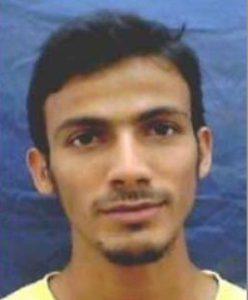
Mohammad Armar
Mohammad Armar was named by State as “a leader and head recruiter [for IS] in India”. Armar “has cultivated a group of dozens of ISIS sympathizers who are involved in terrorist activities across India, such as plotting attacks, procuring weapons, and identifying locations for terrorist training camps,” State reports.
Armar is from Bhatkal, which also produced Anwar Husain, who was killed in Afghanistan in October 2014 fighting for the Taliban-aligned Tauheed-ul-Ansar. Armar is the brother of Sultan Armar, a member of Indian Mujahideen until he formed a breakaway pro-IS faction that moved to Syria. Sultan was killed in March 2015. It was said—wrongly it seems—that Mohammad had been killed in April 2016.
In June 2016, a terrorist plot in India being guided by IS’s Amn al-Kharji was broken up in Hyderabad. The conspiracy, led on the ground by Indian citizen Mohammed Ibrahim Yazdani, was being directed Abu Isa al-Amriki (a.k.a. Abu Sa’ad al-Sudani), who was involved in a number of other cases. Just before his death in April 2016, Abu Isa had handed over to an amni “known only by his Telegram screen name, ‘WindsofVictory’,” who “spoke fluent Hindi”. This new IS handler brought together a network in India and even provided weapons, left in a bag on the branch of a tree. Whether this was Armar is unknown: IS had, as ever, kept its operation so compartmentalized that Yazdani’s cell could not even name the arms merchant working for IS in India.
MOHAMED ISA YUSEF SAQAR AL-BINALI
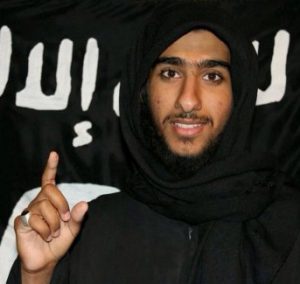
Mohamed al-Binali
Mohamed Isa al-Binali is “a senior member of ISIS,” according to the State Department, who “departed Bahrain to join the terrorist group in 2014 and has since appeared in multiple ISIS propaganda videos calling on Bahrainis, specifically members of Bahrain’s security forces, to join ISIS.”
Mohamed Isa is a relative of Turki al-Binali, one of the most important IS clerics and propagandists, who was likely killed recently by the Coalition. Mohamed Isa’s call on the Bahraini security forces to defect to IS was made in a September 2014 video, shortly after the caliphate declaration and the onset of operation to destroy IS by a coalition that includes Bahrain.
www.mesop.de